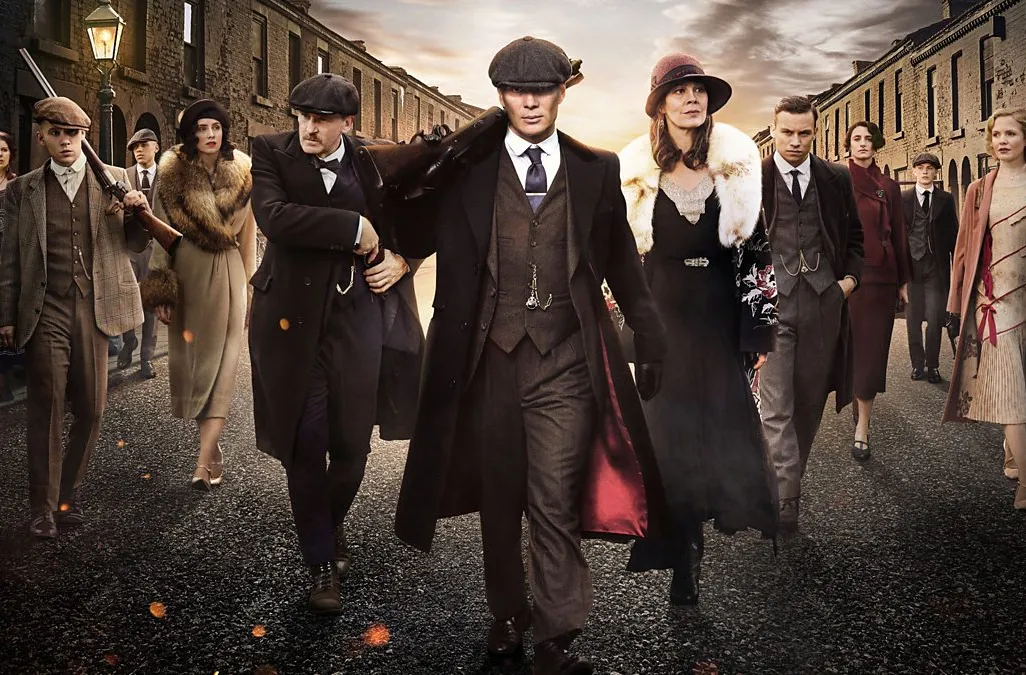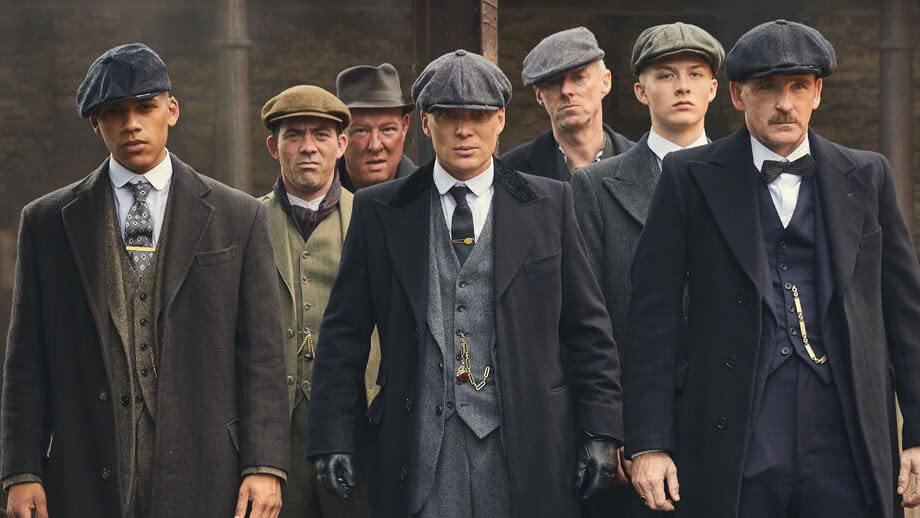Peaky Blinders: Power, Betrayal, and Style

Peaky Blinders – A Revolutionary Crime Drama
Part 1: The Bold Beginnings
“Peaky Blinders” isn’t just another crime drama – it’s a cinematic masterpiece that combines complex characters, thrilling plots, and a unique historical setting to deliver an unforgettable television experience. Created by Steven Knight, this British series, first aired in 2013, follows the rise of the Shelby crime family in post-World War I Birmingham, England. The title refers to the notorious Peaky Blinders gang, who were infamous for sewing razor blades into the peaks of their flat caps. Their violent, ruthless behavior matched the times they lived in – a period marked by societal upheaval, economic decline, and the aftermath of a brutal war that left deep scars on all who lived through it.
At the core of “Peaky Blinders” is Tommy Shelby (played by the charismatic Cillian Murphy), a World War I veteran who emerges as the mastermind behind the gang. Tommy is a complex character, deeply scarred by the horrors of war, yet driven by a desire to build an empire. From the very first episode, the show captures Tommy’s struggle to maintain control over his family while navigating the treacherous criminal underworld. What makes the series particularly captivating is its commitment to character development – every member of the Shelby family, from the charming but deadly Arthur Shelby (Paul Anderson) to the cunning Polly Gray (Helen McCrory), is fully fleshed out with their own story arcs, motivations, and vulnerabilities.
The visual style of “Peaky Blinders” is one of its most striking features. The dark, gritty streets of Birmingham provide the perfect backdrop for the show’s moody aesthetic. The cinematography, paired with a modern, eclectic soundtrack featuring artists like Nick Cave and the Bad Seeds and Arctic Monkeys, creates an atmosphere that’s as atmospheric as it is captivating. This juxtaposition of historical drama with modern elements is one of the series’ most intriguing aspects, giving it a timeless quality that appeals to both history buffs and fans of stylish crime thrillers.
Part 2: The Intricate World of Power and Corruption
As the show progresses, “Peaky Blinders” delves deeper into the power struggles that define both the Shelbys and the society they inhabit. The family’s criminal enterprise begins to grow, attracting the attention of powerful figures, including politicians, business magnates, and rival gang leaders. This expansion is not without its challenges, as Tommy must contend with the ever-present threat of betrayal, both from within his own ranks and from external enemies.
What sets “Peaky Blinders” apart from other crime dramas is its exploration of corruption on all levels of society. The show masterfully weaves together politics, business, and crime, showing how they intersect and feed into each other. From Tommy’s dealings with corrupt politicians like Major Chester Campbell (Sam Neill) to his interactions with the upper echelons of society, the series paints a stark picture of how power and wealth are often built on violence and deception. Tommy himself, while often seen as the anti-hero, isn’t above using manipulation, murder, and strategic alliances to achieve his goals, which adds a layer of moral ambiguity to the show.
The rivalry between the Peaky Blinders and other criminal organizations adds to the tension and intrigue. The introduction of characters like the Italian mafia boss Luca Changretta (Adrien Brody) and the Jewish gangster Alfie Solomon (Tom Hardy) brings fresh dynamics to the series. Their interactions with the Shelby family are marked by high-stakes drama, and the chess-like moves they make to outwit each other only heighten the suspense. The show’s exploration of family loyalty, revenge, and betrayal in this ruthless world makes for gripping television, ensuring that viewers are never quite sure who will come out on top.
Part 3: Historical Context and Political Commentary
One of the most compelling aspects of “Peaky Blinders” is its careful balance between historical accuracy and creative storytelling. While the show is primarily a work of fiction, it is grounded in real historical events and figures. The aftermath of World War I and the impact it had on the people of Britain serves as a backdrop for the story. The trauma and disillusionment faced by returning soldiers, like Tommy Shelby, is depicted in a raw and unflinching way. This historical context adds depth to the show, making it not just a crime drama but a commentary on the socio-political climate of the time.
The rise of fascism and communism during the early 20th century is also a key theme in the series. Tommy Shelby’s interactions with politicians like Sir Oswald Mosley (played by Sam Claflin), a real-life figure who would go on to found the British Union of Fascists, bring a chilling sense of real-world relevance to the story. As the Shelbys expand their empire, they are forced to navigate the turbulent political landscape, dealing with the rise of extremist ideologies and the threat of totalitarianism. This intersection of historical events and the Shelby family’s criminal endeavors adds an intellectual layer to the show, prompting viewers to reflect on how history shapes the present and future.
“Peaky Blinders” also tackles the effects of industrialization, class struggles, and the changing nature of power. The Shelbys’ rise to power coincides with the growth of the working class and the increasing influence of organized labor, and the show doesn’t shy away from depicting the tensions between the rich and the poor. Tommy Shelby’s desire to move up the social ladder is not just about wealth but also about seeking power in a world that is rapidly changing. His battle to assert control over Birmingham’s criminal landscape is also a reflection of the larger societal shifts taking place in Britain during the time period.
Part 4: The Legacy and Impact of Peaky Blinders
As “Peaky Blinders” progresses through its multiple seasons, it evolves from a story about a small-time gang to an expansive epic that explores themes of power, loyalty, and the human condition. The series’ ability to maintain its high level of drama, tension, and style throughout its run is a testament to the quality of writing, direction, and acting. The character arcs, especially Tommy Shelby’s, are deeply satisfying, with each season revealing more about the man behind the myth.
One of the most remarkable aspects of “Peaky Blinders” is its cultural impact. The show has gained a devoted following, with fans around the world drawn to its compelling characters, gripping storylines, and stunning visuals. The Peaky Blinders style – from the sharp suits to the iconic flat caps – has even influenced fashion, with clothing brands launching collections inspired by the show. The show’s soundtrack, blending modern rock with classic elements, has also been widely praised for its ability to enhance the mood and tone of the series.
Moreover, “Peaky Blinders” has sparked important conversations about the nature of crime, power, and social mobility. While it is undeniably a thrilling crime drama, it is also a commentary on the human desire for control and the lengths people are willing to go to achieve their ambitions. The Shelbys, with all their flaws and dark tendencies, are ultimately a reflection of the complex nature of humanity – capable of both great love and ruthless cruelty.
In conclusion, “Peaky Blinders” is more than just a television show. It is a bold, stylish, and thought-provoking examination of power, family, and ambition. Its rich character development, intricate plotting, and historical context make it one of the most impactful crime dramas of the past decade. With Tommy Shelby at the helm, the show remains a testament to the allure of anti-heroes and the brutal realities of life in the criminal underworld.
Hashtags: #PeakyBlinders #TommyShelby #CillianMurphy #CrimeDrama #Gangsters #HistoricalDrama #Birmingham #FamilyLoyalty #PowerStruggles #BBC
Related Movies: https://www.youtube.com/watch?v=w-5ICl5eHcE











